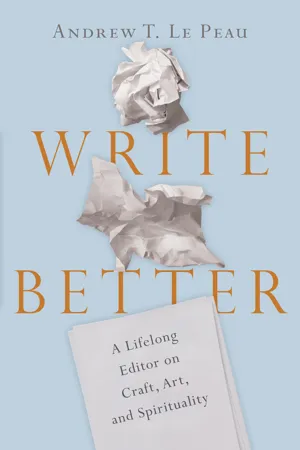BEGINNINGS MATTER.
If on the first day of your diet you accidentally eat three jelly donuts—that is not a good beginning. If you are late for a job interview because you rear-end a beer truck—that is not a good beginning. If you trip and crash into your future mother-in-law the first time you meet her—that is not a good beginning.
But if in the spring you turn over the soil and add the right nutrients before you plant, your garden can be productive during the whole season. If you make good friends in your first weeks of college, that can make the difference in sticking with school and ultimately graduating. If the opening sentences of what you write are just right, they can be a balm to readers and a joy to you.
Strong beginnings arrest attention and alert readers for what is to come. With so many options for our time—pressures of work, school, or family; opportunities for relaxation or entertainment—readers need to be compelled to hear what we have to say and to keep going. They won’t commit to reading a paragraph, a page, an article, or a book out of a generous spirit. No. We as writers must make it possible for them to draw away from other attractions and distractions. A writer in search of a way to pull readers in need look no further than a strong opening.
No single formula exists. Openings come in great variety. Here are some of my favorites.
THE THESIS OPENING
Having a clear statement of your main point is an obvious and legitimate way to begin. The danger is that it can become convoluted and abstract. One solution is to make it personal, punchy, or provocative.
Life is difficult.
M. Scott Peck, The Road Less Traveled
With only three words Peck flings a bucketful of cold realism into our overly optimistic faces, waking us from our self-help stupor. Part of the power of his opening comes from the contrast it presents to a society committed to the easy life. Losing weight should be as easy as taking a pill. Loving someone should be simple. Learning a language should be as painless as listening to a recording. We just don’t want to hear that all these take time and effort. But once we come to peace with that truth, says Peck, life becomes better.
Even fiction can begin strongly with a very nonfictiony proposition.
All happy families are alike; each unhappy family is unhappy in its own way.
Leo Tolstoy, Anna Karenina
Because no self-respecting novelist would write a story like a lot of others, we know this will be a story about one of those unique, unhappy families.
Were thesis openings the thing to do in the nineteenth century? I don’t know, but they certainly knew how to do it well. Here’s another:
It is a truth universally acknowledged, that a single man in possession of a good fortune must be in want of a wife.
Jane Austen, Pride and Prejudice
And we know just the woman for just such a man—or at least we will shortly!
THE PARTICULAR-TO-GENERAL OPENING
Rather than being broad and expansive, another option is to offer a specific, detailed opening that draws readers in. They become engaged as they place themselves in a particular scene.
Air-conditioned, odorless, illuminated by buzzing fluorescent tubes, the American supermarket doesn’t present itself as having very much to do with Nature.
Michael Pollan, The Omnivore’s Dilemma
Pollan engages all our senses by giving concrete facets of sight (fluorescent lighting), sound (buzzing), smell (sterile), and touch (the cool of the air-conditioning)—all in the service of taste. Because of these few details, we can picture the whole scene, even those things he doesn’t mention—the fruit piled up in perfect pyramids, the polished floors, the trendy shelving. We are captured by immediacy.
Notice, though, that Pollan doesn’t just pick any old details. The lighting is artificial, the buzzing is mechanical, the temperature is engineered, the smell is unnaturally void. They all deliberately point to one thing—his thesis. The food industry in America is ironically disconnected from nature. And that disconnect, when we stop to look at it, isn’t really all that pretty. Pollan moves us effortlessly from the particular to the general in a single sentence.
Sometimes the more immense and complex the topic, the more important it is to bring things down to a human scale.
At exactly fifteen minutes past eight in the morning, on August 6, 1945, Japanese time, at the moment when the atomic bomb flashed above Hiroshima, Miss Toshiko Sasaki, a clerk in the personnel department of the East Asia Tin Works, had just sat down at her place in the plant office and was turning her head to speak to the girl at the next desk.
John Hersey, Hiroshima
A year after the first atomic bomb exploded over Japan, most people still had little idea what exactly it was or how it worked. Its sheer magnitude and unfathomable physics made it seem like something out of science fiction.
To overcome this barrier, John Hersey in his 1946 piece opens with a specific instant, with a specific person doing something very particular and very routine. A woman sitting at a desk in an office. Nothing could be more ordinary, except for what happened at that moment.
All his readers would know the bomb dropped. What they didn’t know was what happened to Miss Toshiko Sasaki. An individual. Someone like you or me who might be about to talk to a colleague. In this way readers can begin to come to grips with a new era of warfare we will never be able to turn back from.
Picking the right details to include in an opening is key.
There is a housing project standing now where the house in which we grew up once stood, and one of those stunted city trees is snarling where our doorway used to be.
James Baldwin, “Fifth Avenue, Uptown” in Nobody Knows My Name
What do we know generally from this first sentence? We’re reading (or at least we are starting with) memoir. It’s a personal account of a moment that reflects on the author’s past.
Baldwin does so much more, however, simply and powerfully. Just two words set the tone for the whole piece. With stunted and snarling he invokes a sense of lament. The home he grew up in, with all its intimate memories of joys and sadness, is now replaced with a massive, bureaucratic building. Like the tree “where our doorway used to be,” the life in this new building is limited, confined, restricted. There is no room for growth. We do not have a tree happily wagging its branches in welcome. Instead, that tree, squat and unformed, stands guard at the door like a growling dog unwilling to let him in. Thus Baldwin begins his reflection on place, race, and loss.
THE HUMOROUS OPENING
It’s hard to miss when you start with something funny.
I come from Des Moines. Somebody had to.
Bill Bryson, The Lost Continent
Bryson begins his travelogue through small-town America in his home state of Iowa. We join him as he travels thirteen thousand miles, east to west, smiling and chuckling all the way with his wit and droll observations.
Regarding his frequently intoxicated neighbor, he says, “Everywhere you went you encountered telephone poles and road signs leaning dangerously in testimony to Mr. Piper’s driving habits.” And while on his crisscross country tour he noticed a sign which read, “BUCKLE UP. ITS THE LAW IN ILLINOIS. Clearly, however, it was not an offense to be unable to punctuate.”1 But it was Bryson’s opening line that prepared us for this whole enjoyable ride. As does this:
Had CC de Poitiers known she was going to be murdered she might have bought her husband, Richard, a Christmas gift.
Louise Penny, A Fatal Grace
With a fine comic touch we see immediately that our murder victim is so self-absorbed she couldn’t be counted on to buy her own husband a Christmas present—even if her life depended on it.
THE DRAMATIC OPENING
If you’ve got a dramatic story to tell, don’t shy away from it.
The French had collapsed. The Dutch had been overwhelmed. The Belgians had surrendered. The British army, trapped, fought free and fell back toward the Channel ports, converging on a fishing town whose name was then spelled Dunkerque.
Behind them lay the sea.
William Manchester, The Last Lion: Visions of Glory
The first short, rapid sentences pound away at us like German artillery that will not stop. Manchester then gives us a brief respite, breaking up the terseness with a long sentence before finishing us off with an ominous five-word image: “Behind them lay the sea.” He uses no emotionally charged words like disheartened, dazed, or desperate. He doesn’t have to. We feel it already.
Next we feel the heat.
It was a pleasure to burn.
Ray Bradbury, Fahrenheit 451
The sinister, almost sadistic, quality of this dystopia glows through this deceptively simple sentence. In grim irony, the firemen of the society Bradbury has created don’t put out fires. They start fires. And they love to burn books.
THE INTRIGUING OPENING
We’ve become all too used to clickbait headlines we see on the web (“10 Surefire Ways to Lose Weight: You Won’t Believe #7”). Creating intrigue is a valid approach, but we shouldn’t follow the formula of being somewhat misleading and crassly provocative. Better options are available.
Making readers curious is the flipside of the thesis opening. Instead of being straightforward, we are oblique and mysterious. We rouse their interest, and in doing so encourage them to keep reading to find out what we mean, how what we say could be true, or what will happen next.
You may not believe me, but I have news about global warming: Good news, and better news.
Noah Smith, “The End of Global Warming,” The Atlantic
Smith sets up a thesis that is contrary to much conventional wisd...






